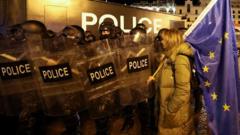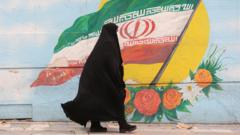The Georgian government, led by Prime Minister Irakli Kobakhidze, has declared it will cease efforts to join the EU after the European Parliament rejected recent election results, prompting protests throughout the nation.
Georgia Delays EU Membership Bid Amid Election Controversy

Georgia Delays EU Membership Bid Amid Election Controversy
Georgia has announced a postponement of its bid to join the European Union until 2028, following a contentious parliamentary election that faced widespread allegations of fraud.
Amid accusations of election irregularities, the Prime Minister argues that the EU's actions constitute "blackmail," leading to a fractious political landscape. Kobakhidze revealed the decision to postpone EU discussions until at least 2028, affecting Georgia's long-term aspiration for integration with Europe. Thousands of citizens rallied outside the Tbilisi parliament building, showcasing their discontent through protests marked by the waving of EU flags.
The backdrop to this political upheaval involved a parliamentary election last month that was won by the ruling party, Georgian Dream, which is criticized by opposition factions for purportedly shifting Georgia's orientation away from the EU and towards closer ties with Russia. The election was marred with accusations of vote buying, voter intimidation, and various forms of manipulation, resulting in opposition members boycotting parliament and labeling the vote as unconstitutional.
The European Parliament, voicing concern over Georgia's ongoing democratic crisis, called for a re-run of the recent elections, attributing responsibility to the ruling party for the alleged irregularities. Following this resolution, Prime Minister Kobakhidze insisted that his government would focus on essential reforms needed for EU candidacy and reiterated a plan to achieve full integration by 2030, contingent upon the EU respecting Georgia's national interests.
As tensions escalated in Tbilisi, riot police deployed pepper spray and water cannons against protests where demonstrators accused the government of staging a coup. Voices from the streets claimed a lack of legitimacy in the current administration, reflecting a broader divide between the government and a populace eager for a European future, yet wary of re-emerging Russian influence. The protests symbolized a pivotal moment in the nation’s ongoing struggle for democratic integrity and alignment with European ideals.
The backdrop to this political upheaval involved a parliamentary election last month that was won by the ruling party, Georgian Dream, which is criticized by opposition factions for purportedly shifting Georgia's orientation away from the EU and towards closer ties with Russia. The election was marred with accusations of vote buying, voter intimidation, and various forms of manipulation, resulting in opposition members boycotting parliament and labeling the vote as unconstitutional.
The European Parliament, voicing concern over Georgia's ongoing democratic crisis, called for a re-run of the recent elections, attributing responsibility to the ruling party for the alleged irregularities. Following this resolution, Prime Minister Kobakhidze insisted that his government would focus on essential reforms needed for EU candidacy and reiterated a plan to achieve full integration by 2030, contingent upon the EU respecting Georgia's national interests.
As tensions escalated in Tbilisi, riot police deployed pepper spray and water cannons against protests where demonstrators accused the government of staging a coup. Voices from the streets claimed a lack of legitimacy in the current administration, reflecting a broader divide between the government and a populace eager for a European future, yet wary of re-emerging Russian influence. The protests symbolized a pivotal moment in the nation’s ongoing struggle for democratic integrity and alignment with European ideals.




















